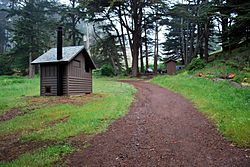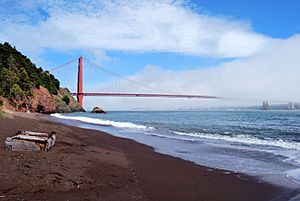Kirby Cove Camp facts for kids
Quick facts for kids Kirby Cove Camp |
|
|---|---|

A view of campsite #4 with outhouse
|
|
| Location | Golden Gate National Recreation Area, Marin Headlands |
| Coordinates | 37°49′37″N 122°29′26″W / 37.827039°N 122.490638°W |
| Elevation | Sea Level |
| Type | Drive in |
| Campsites | 4 overnight sites and 1 day use site |
| Facilities | Picnic Table, Waterless toilet |
| Water | None |
| Fee | $30 per night camping, $45 day use picnic area |
| Fires | Fire Ring, BBQ Grill |
| Season | March to November |
| Website | recreation.gov |
Kirby Cove Camp is a special campground and beautiful area. It's managed by the Golden Gate National Recreation Area (GGNRA) in the Marin Headlands, California. Imagine camping right at sea level! The camp sits below Conzelman Road, which winds up from the north end of the famous Golden Gate Bridge. From there, you can look out over the Golden Gate strait, which connects to San Francisco Bay. To get to Kirby Cove, you follow a road past a locked gate. This road starts just beyond Battery Spencer, which are old military bunkers near Highway 101.
Contents
Discover Kirby Cove Camp
Kirby Cove Camp is on the north shore of the Golden Gate. It's a cozy, sheltered spot. You'll find a small beach with rocky cliffs on both sides. An old coastal defense site, called Battery Kirby, sits between the campground and the beach. Many trees grow here, like eucalyptus, pine, and Monterey cypress. These trees and the steep hills around the cove help block the strong winds from the Golden Gate. Even though it's close to the big city of San Francisco, Kirby Cove feels like a quiet, hidden getaway.
Fun Activities at Kirby Cove
There are four campsites for staying overnight and one spot for day use. Campsite 1 is on a bluff, which is a high, flat area, above the eastern part of Kirby Cove Beach. Campsites 2, 3, and 4 are tucked away in groves of trees, a bit further from the water.
If you want amazing views, walk to the bluff above the beach. You can sit at a picnic table and see the Golden Gate, its huge bridge, the city of San Francisco, and Land's End.
To explore the area, you'll need to hike past the locked gate. Then, you walk about a mile down the road to reach the campsites and Battery Kirby.
Remember, you need to make reservations for Kirby Cove Camp. This applies whether you're camping overnight or just visiting for the day. There are rules about how long you can stay. This helps make sure many different people get a chance to enjoy this special place.
The Story of Battery Kirby
 |
|
| Location | Golden Gate, California |
|---|---|
| Coordinates | 37°49′37″N 122°29′26″W / 37.827039°N 122.490638°W |
Building started in 1898 to put a large artillery battery in the valley. This spot was just above a small beach near the entrance to San Francisco Bay. When the plan was approved, the defensive battery was first called "Gravelly Beach Battery." This name came from the very gravelly beach at the site.
Later, the battery was renamed Battery Kirby. This was to honor 1st Lieutenant Edmund Kirby. He was a brave soldier in the Civil War. He was promoted to brigadier general on the day he died in battle, May 28, 1863, at the Battle of Chancellorsville. The name "Kirby" then spread to the valley where the battery was built. Now, it's also the name of the National Park Service campground.
Battery Kirby was used from 1898 until March 30, 1934. At that time, it was considered too old and no longer needed.
Here are some interesting facts about Battery Kirby:
- Battery Kirby had two very large 12-inch guns. These were called breech-loading rifles.
- The guns were made in New York.
- When the battery was no longer used, the guns were sent to the Philippines in 1933 and 1941.
Originally, this windy valley at Kirby Cove had very few trees. The forest you see today was planted over many years. This happened while Battery Kirby was being built and used. Today, cypress, eucalyptus, and pine trees fill the area.
Image gallery
Images for kids
 | Lonnie Johnson |
 | Granville Woods |
 | Lewis Howard Latimer |
 | James West |













